Analysis: How Iran presidential hopefuls outlined their economic plans in 1st debate
By Alireza Akbari
Six candidates running for the presidency of the Islamic Republic of Iran presented their comprehensive economic plans and strategies in the first televised debate on Monday night.
It was the first of five debates broadcast live on the Islamic Republic of Iran Broadcasting (IRIB).
The six hopefuls have been busy campaigning for the past week following their approval by the nation’s top election supervisory body, outlining their plans and priorities to win voters’ favor.
Monday’s debate focused entirely on their economic plans and the implementation of the seventh development plan, strategies to combat inflation, plans for the private sector, boosting production, and increasing public involvement in the economy.
The four-hour debate, which commenced with the recitation of holy verses, was structured into four segments, with each candidate taking turns to address questions about their economic strategies in two 4-minute intervals during the first three sections.
The debate concluded with each candidate summarizing their economic agendas in short presentations.
Significant emphasis was placed on the directives of the Leader of the Islamic Revolution Ayatollah Seyyed Ali Khamenei regarding the election, emphasizing "robust public engagement."
A moderator echoed the sentiment of Iran’s top anti-terror commander General Qassem Soleimani that a glorious election holds more power than any military maneuver.
The presidential candidates also paid tribute to President Ebrahim Raeisi, who passed away in a helicopter crash last month, extolling his services to the nation.
Segment 1:
The questions posed during the first segment of the debate centered around implementing the seventh development plan, particularly focusing on achieving an 8 percent growth target.
The candidates were scrutinized for their strategies to attract capital, improve the business climate, and ensure economic stability for the country.
During his allotted eight minutes, Amir-Hossein Ghazizadeh Hashemi, a former parliamentarian, underscored the need for $200 billion to actualize the seventh development plan.
He highlighted the enforcement of subsidy targeting laws and advocated mitigating unpredictable economic trends.
Voicing support for foreign investment, Ghazizadeh Hashemi stressed the importance of customs, taxes, and foreign policy alignment with production and family welfare as pivotal to his economic agenda.
Mohammad Baqer Qalibaf, the Iranian parliament speaker, proposed incremental improvements to address economic hardships.
He echoed his campaign theme of enhancing public and investor participation in the economy to sustain purchasing power, emphasizing productivity, cohesion, and efficient economic management.
The veteran lawmaker and former Tehran Mayor also cited family-centric policies and economic predictability as key principles for the seventh development plan.
Highlights: First debate in 2024 Iran presidential election#IranVotes2024 https://t.co/NzEVBKyBWP pic.twitter.com/j3D7EcQ6HF
— Iran Election 2024 (@PressTVElection) June 17, 2024
Masoud Pezeshkian, a former health minister and a seasoned lawmaker, outlined his comprehensive strategy emphasizing internal cohesion, societal inclusivity, expert engagement, and global interaction to execute the plan effectively.
He promoted export growth and foreign investment as catalysts for economic expansion, advocating for transparency in economic governance.
Saeed Jalili, a former lead nuclear negotiator and head of the country’s top security body, broadened the discourse beyond capital attraction, emphasizing capital management, technological integration, and public engagement as pivotal to achieving substantial economic growth.
He highlighted the need for leveraging elites’ capabilities, international cooperation, and streamlined trade mechanisms to optimize currency allocation for exports and imports.
Alireza Zakani, the mayor of Tehran and former lawmaker, articulated an economic strategy pivoting on leveraging domestic, regional, and global opportunities, and strongly advocated for de-dollarization and bolstering the national currency.
He prioritized public involvement in economic initiatives and advocated for equitable wealth distribution across different segments of society.
Mostafa Pourmohammadi, former interior affairs minister, expounded on the interconnectedness of the economy with political, social, and cultural dynamics, asserting that economic challenges necessitate addressing international issues with strategic foresight.
He emphasized national unity and trust as key to resolving economic issues while highlighting the need for increased international engagement.
Segment 2:
The second segment of the debate was primarily centered on enhancing public participation in the economy, empowering the private sector, and effectively utilizing the resources of the populace.
Ghazizadeh Hashemi advocated for economic transparency through mechanisms like the stock market. He described the private sector as a strategic government partner, crucial for increasing tax revenues, and suggested drawing on global experiences.
He also asserted that the people could excel in economic endeavors.
Qalibaf focused on enhancing productivity as a key aspect of his economic policy. He emphasized the need to prevent subsidy wastage, neutralize sanctions, and foster public participation.
The veteran diplomat also discussed leveraging the capacities of international blocs such as the Shanghai Cooperation Organization (SCO) and BRICS, and the significance of agreements with China and Russia. Additionally, he addressed the importance of implementing international financial agreements and maintaining financial discipline.
Take a look at some important slogans and plans of the presidential candidates on various issues.#IranVotes2024 https://t.co/Tli4JAJynZ pic.twitter.com/0Scb9oeCr0
— Iran Election 2024 (@PressTVElection) June 17, 2024
Pezeshkian advocated for an expert-driven approach informed by international experiences. His strategy involved reforms, privatization, and the employment of skilled professionals.
He emphasized utilizing science, experience, and the successful practices of countries following World Bank guidelines to achieve his government's economic objectives.
Jalili championed utilizing the nation's inherent opportunities and maintained that a strong government could effectively address economic challenges.
The presidential contender stressed the importance of domestic capacities for currency inflow and integration of science and knowledge. He believes the capital market should serve as a platform for public involvement.
Zakani invoked a statement by the late founder of the Islamic Revolution Imam Khomeini, asserting that the government should refrain from intervening in areas where people can operate.
He advocated for the private sector as the economic engine, drawing on his experience as mayor to discuss financial discipline and anti-corruption measures. His economic goals included financial transparency, public oversight of government, inflation control, and prudent liquidity management.
Pourmohammadi stated that proper policies, supported by experts, people, and capabilities, could resolve economic issues. He emphasized societal support and trust, along with the power of diplomacy, as critical elements and addressed the need to curb inflation and prevent currency shocks in the market.
Segment 3:
The third segment of the invigorating debate focused on strategies for curbing inflation, addressing the budget deficit, channeling liquidity toward production, and reforming the banking system.
Ghazizadeh Hashemi argued that reforming current stock market policies is essential to restoring public trust. He asserted that his administration could achieve single-digit inflation, emphasizing the need for political authority and internal governance.
The presidential hopeful highlighted the importance of boosting productivity and instituting discipline within the financial system.
Qalibaf identified inflation as a critical issue, proposing solutions such as reforming the banking system, channeling capital into production, and overhauling the budget structure.
He stressed the necessity of political cohesion, strong presidential leadership, and hard work, advocating leveraging both global and domestic expertise. He also suggested that elite decision-makers should guide these reforms.
Pezeshkian focused on transparency in expenditures, cost control, and supervisory reforms to mitigate economic deficiencies. He emphasized utilizing experienced domestic figures and insisted on strict government budget control.
✍️ Feature - Iran and the world: Foreign policy blueprints of six presidential candidates
— Iran Election 2024 (@PressTVElection) June 17, 2024
By Alireza Akbari#IranVotes2024 https://t.co/VMyXPxeTYS
The candidate also mentioned seeking advice from successful Muslim countries on these issues.
Jalili underscored the importance of financial discipline and governmental control over monetary circulation. He identified two critical areas that need resolution: banking and budgetary imbalance.
He stressed the importance of avoiding resource wastage in the budget, managing the foreign exchange allocation process correctly, and setting clear priorities for foreign exchange spending.
Zakani highlighted the effective use of liquidity, emphasizing public participation in the economy. He advocated for increasing production while optimizing consumption.
The Tehran mayor also stressed the importance of enhancing the national currency's value and turning threats into opportunities through meticulous planning.
Pourmohammadi emphasized the necessity of expert opinions and robust presidential management for successful economic reforms.
He highlighted principles such as market economy, economic growth, financial discipline, government oversight, public participation, and a resilient economy as vital to achieving economic success.
In closing remarks, each candidate was given approximately six minutes to outline their economic plans.
Ghazizadeh Hashemi emphasized his faith in domestic capabilities. Qalibaf underscored the pivotal role of public involvement in the economy.
Pezeshkian, highlighting the importance of consultation, promised transparency and honesty as his foremost commitment to the nation. Jalili emphasized that a fundamental requirement for making a decisive leap forward is for the president to clearly articulate his priorities.
Zakani expressed his ambition to advance justice and progress. Pourmohammadi, meanwhile, regarded public participation in the elections as the cornerstone of national authority.
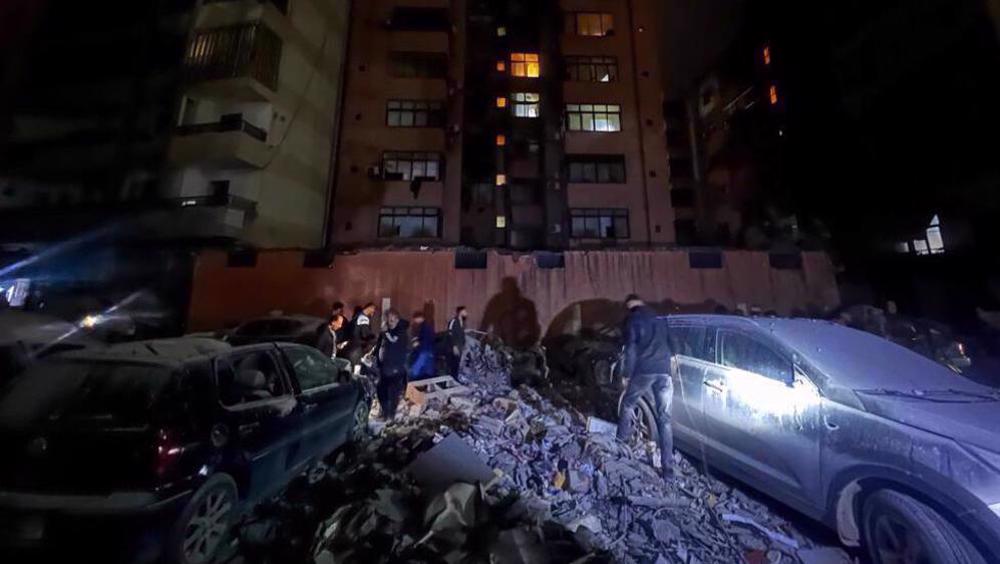
Iran condemns Israel’s continued aggression against Lebanon
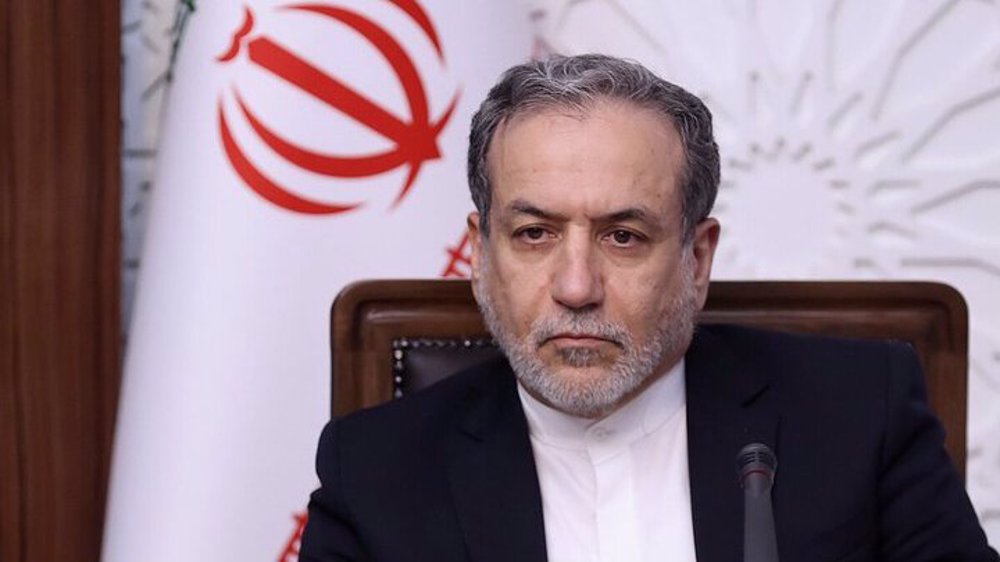
No such thing as ‘military option’ let alone ‘military solution’ to nuclear issue: Iran
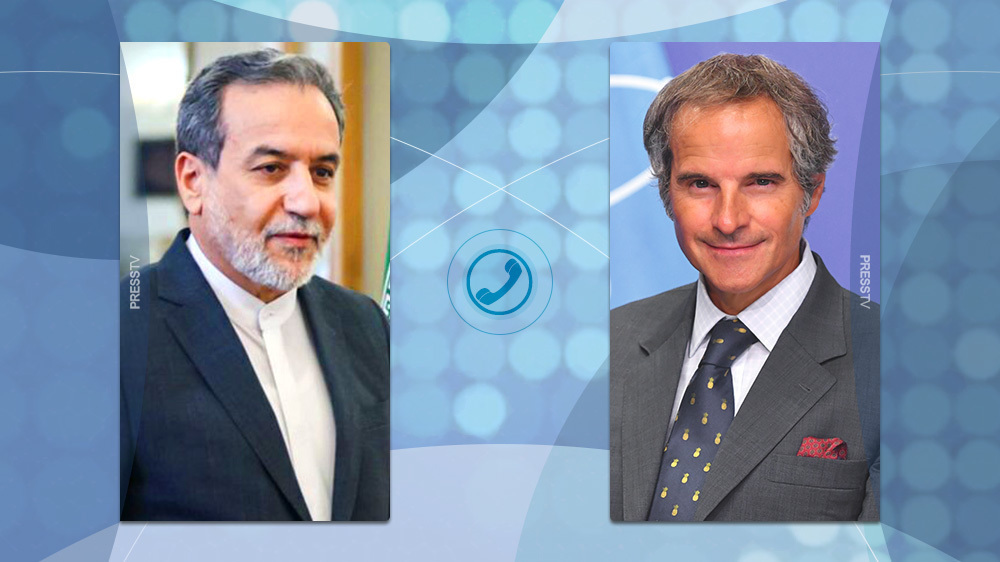
Iran urges IAEA to take a clear stance against threats to its nuclear facilities
Report: Saudi, UAE, Qatar, Kuwait ban US warplanes for strikes
VIDEO | The day Iran said: Yes
More journalists killed in Gaza than in both World Wars combined: Report
US lawmakers move to block arms sales to Israel amid Gaza war
Turkey readies plans to take over Syria’s T4 airbase: Report
VIDEO | Press TV's news headlines
Iran condemns Israel’s continued aggression against Lebanon
VIDEO | Iran Islamic Republic day


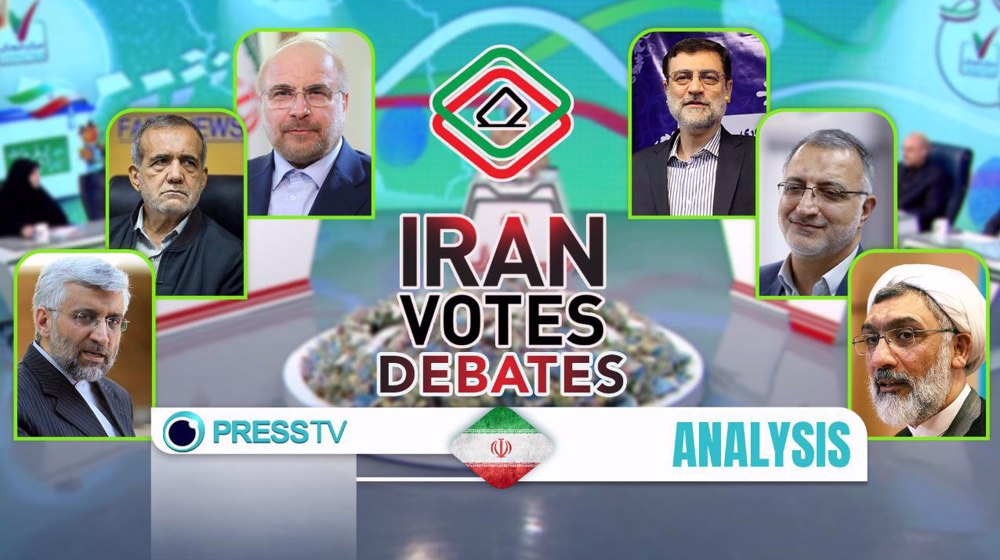



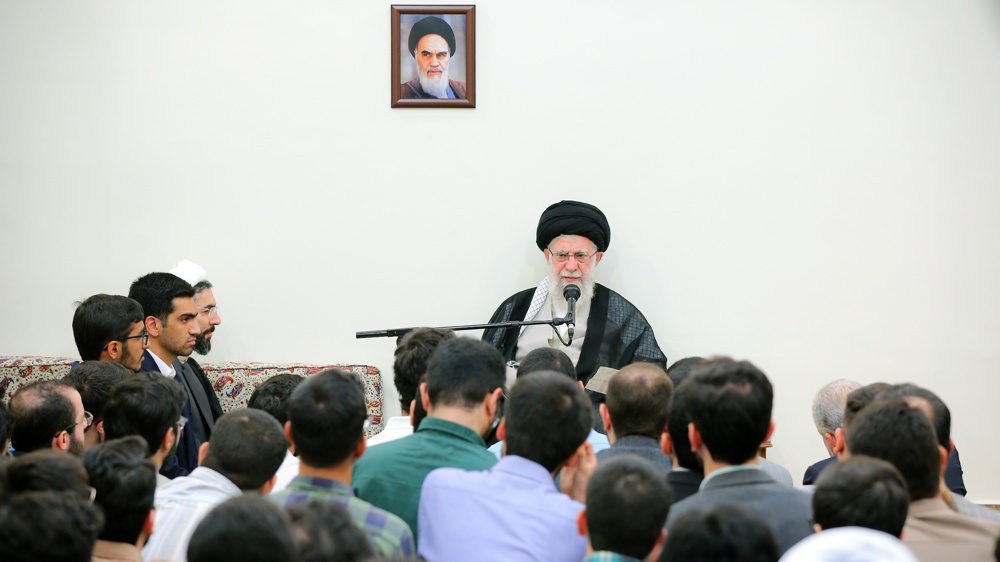
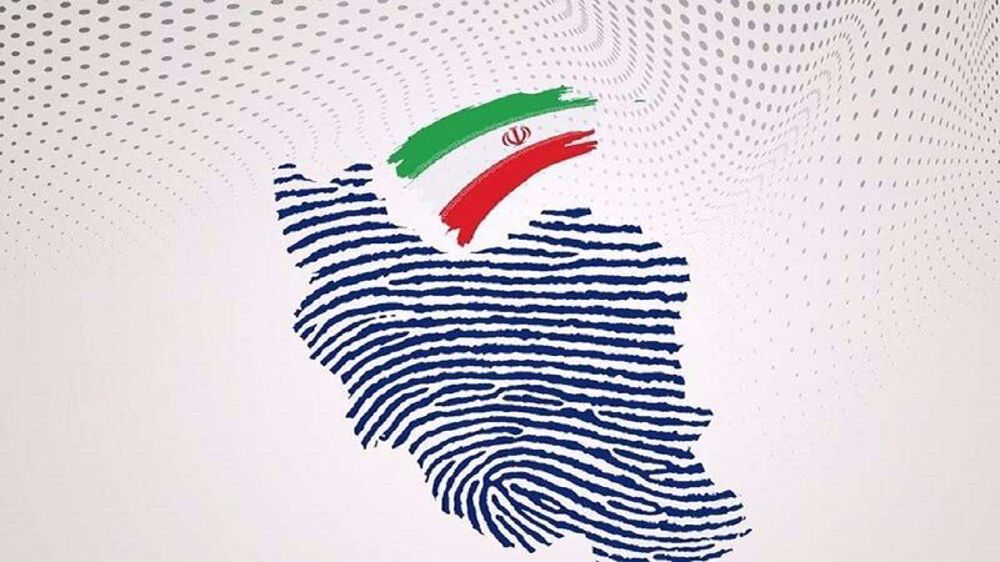
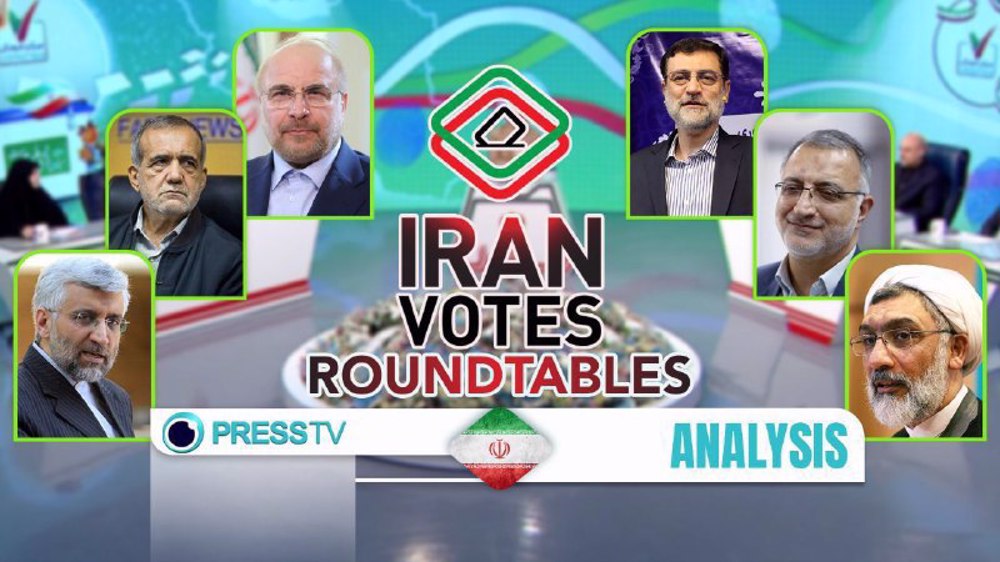
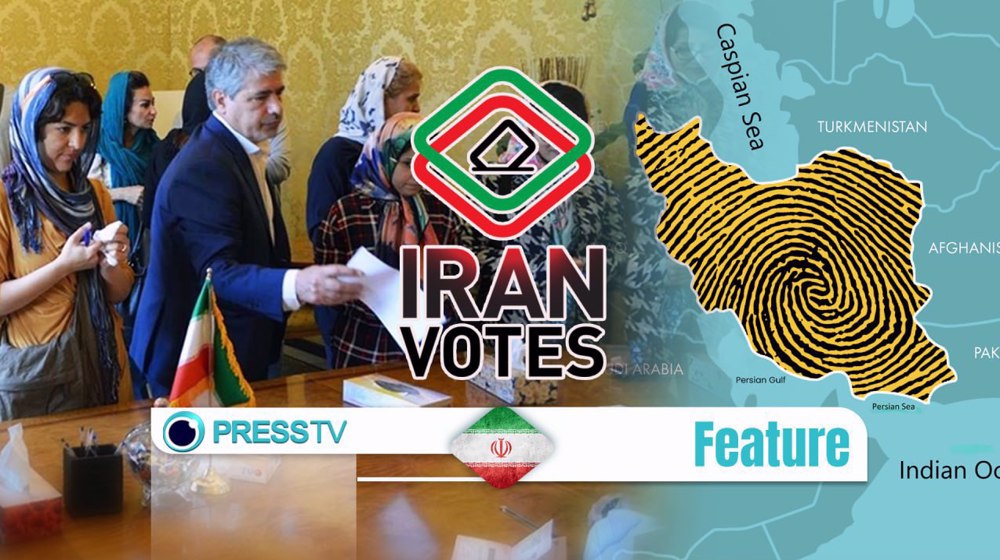

 This makes it easy to access the Press TV website
This makes it easy to access the Press TV website